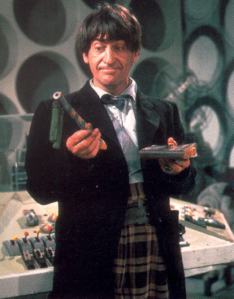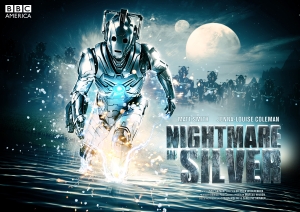jason stives talks Who with one of the most beloved authors in sci-fi and fantasy history …
Expletives are nothing new to sci-fi and fantasy fans and they tend to be helpers to describe how awesome something is. Author Neil Gaiman tends to get this treatment at his mere mention and it truly sounds great when conducted. Neil “expletive” Gaiman has all rights to be given this middle name considering his wealth of contributions to the worlds of literature, comics, television, and film over the last 25 years. Starting with his acclaimed comic series Sandman in 1988, he has crafted a unique style of writing that has shaped contemporary fantasy fiction as we know it. But he also contributes to already established works as well. Take for instance his work writing for one of his childhood influences, Doctor Who, where he penned the Hugo Award-winning episode “The Doctor’s Wife” for the show’s sixth series in 2011.
For the show’s most recent season, which ended this past week, Gaiman came back and wrote the penultimate story, “Nightmare in Silver.” Gaiman retooled one of the show’s greatest baddies, The Cybermen. While Gaiman considers it a dream come true to have written for the show, and then being asked to return for a second helping, he admits he was not keen to have a return visit to the TARDIS considering his often hectic schedule.
“The entire episode began with an e-mail from Steven (Moffat). The first one saying if I would like to write another Doctor Who episode and me writing back and saying I really didn’t have the time,” he says in hindsight. “Then it was him writing back and saying if I could find time somehow, he’d really like it if I made the Cybermen scary again. That one got to me because when I was a kid, I was a huge Patrick Troughton fan. I remember “The Moon Base,” the second outing of the Cybermen and I was terrified of them. I was much more scared of them than I was the Daleks, because they were sort of quiet and they slipped in and out of rooms and it was very off putting.”
Gaiman’s fond memories of seeing the silver nemesis on screen for the first time can’t really compare to how the Cybermen have been in recent years. Gone are the plastic piping and silver flipper hands replaced with a clunky steam punk exterior that’s louder than thunder. This look and their overall mystique has been lost on many but thankfully the author came armed with a list of things he wanted to see his Cybermen do, but alas not everything made it in.
“I wanted them to be much more silent than they actually are; the only noise we would ever hear from them was the point where they pump their chests, but I got so many of the things that I wanted in the end,” he said. “We have a new costume and we have a new look. We have something much more dangerous to the point where if one of these things shows up again I think people will be a lot more worried than they are currently about the old sort of Cybermen.”
Beyond his own list of requests he wanted to flesh out the metal giants with a bit of modern social commentary. In order to do this he turned to something that helped spawn their conception: advances in technology. When writers Kit Pedler and Gerry Davis created the famous Mondasians back in 1966 they were influenced by the advances in limb augmentation and organ transplants. In 2013 finding something to relate the Cybermen to is just as easy as looking at the cell phone in your pocket which is exactly what Neil did.
“My phone doesn’t look anything like what it looked like five years ago. My computer looks nothing like it looked 15 years ago. So I thought, well, Cybermen talk about upgrading so let’s watch them upgrade,” he said. “So what would an upgraded Cyberman do? One of the things it would do is move pretty fast. I loved the idea of a Cyberman that was essentially so dangerous that if you find one on your planet, you blow up the planet. Planets are expendable but a Cyberman, if you can’t destroy it immediately, is not.
For Gaiman looking back to the show’s roots is a way of looking towards the show’s future. Growing up barely old enough to remember the first story in 1963, he ultimately developed fond memories of the series through the years especially of those late sixties stories when Patrick Troughton’s second Doctor held the keys to the TARDIS.
“He was the Doctor for me. Everybody always underestimated him because he seemed to be a little bit goofy while the things he went up against were huge and terrifying. And he would win somehow” he says in retrospect. “There was a weird feeling here that things were big and complicated and the Doctor didn’t really know it all, but he was The Doctor who I would’ve wanted to go off in the TARDIS with. I loved the feeling back then that events have consequences and that some of those consequences are going to be lethal.”

If traveling with Rhe Doctor for the adult Neil means writing his own takes on the shows most iconic elements, then he is certainly enjoying the ride. However, this time there were parameters. While the Doctor’s Wife found Gaiman writing straight from the heart with an idea he had been thinking of for years, being given a specific goal made the experience even more interesting than if he had started from scratch.
“It’s a wonderful thing as a writer to be given parameters and walls and barriers. If you’re a writer and somebody says you can write anything you like about anything at all, I’m not very likely ever to write those stories,” he muses. “Whereas if someone says to me, ‘We’d like a really good story about Shakespeare and cats,’ I’m much more likely to go, “What? Well, how can you ask me about Shakespeare and cats? Well, hang on, that would be great.”
Further exploration of the Whoniverse is not out of the question for Gaiman but he has no immediate plans to contribute another script to the show. Still, he admits that there is one dream he wouldn’t mind fulfilling and that’s creating a monster that stands the test of time.
“It’d have to be one that’s interesting enough or fun enough to come back written by somebody else or turn up completely reinvented,” he said. “I’d love to do that, a feeling that you’d actually left something behind. That would be wonderful. The trouble with everything these days, for me, is time. There is only one me. There are a ridiculous number of demands on my time. I think they’ll have me back. They seem to like me at Doctor Who and I know I definitely like them.
For Doctor Who fans, let alone Neil Gaiman fans, let’s hope that day comes sooner rather than later.
All Photos Credit: BBC America






Comments are closed.